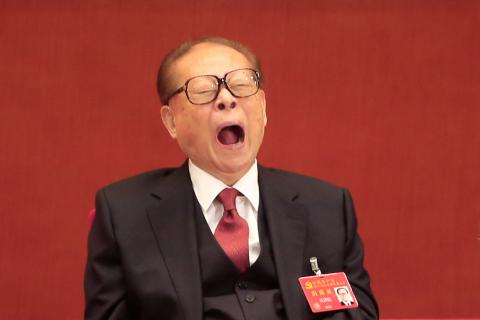Rumored to have died a few months ago, 91-year-old former Chinese president Jiang Zemin (江澤民) yesterday roused social media users by taking a prominent place at the Chinese Communist Party’s 19th National Congress.
Proving that reports of his demise were greatly exaggerated, the former leader sat next to Chinese President Xi Jinping (習近平) and stood for the national anthem as the twice-a-decade congress opened on national television in Beijing’s Great Hall of the People.
Many Chinese Internet users gushed over the elderly “Frog” — an affectionate nickname inspired by Jiang’s wide grin and prominent bespectacled eyes — marveling over the apparently still hale nonagenarian in postings sprinkled with frog emojis.

Photo: Reuters
“I want to ask about his secret for longevity,” one posting said.
“How many organs must he have had replaced to be standing in the middle of the stage?” asked another, before China’s notorious Internet censors swooped in to delete most of the postings within a couple of hours.
Guided into his chair by two ushers, Jiang and his oversized glasses stood out in the crowd of dark-suited party leaders.
He occasionally glanced at his watch or examined Xi’s speech with a large magnifying glass, while his comrades sat motionless and flashed his trademark smile in a conversation with Xi.
Chinese president for a decade from 1993, Jiang is occasionally the subject of rumors about his demise.
In May, online speculation swirled that Jiang had died of a stroke in Shanghai, which he formerly governed as mayor and party chief. He was subsequently seen in public.
Past presidents are typically on hand for the congress, during which the top leadership and party policies for the next five years are set in stone. Jiang’s immediate successor, former Chinese president Hu Jintao (胡錦濤), 74, was on Xi’s right.
A former factory engineer, Jiang came to power in the traumatic aftermath of the 1989 Tiananmen Square Massacre and led China through an era of stunning economic transformation.
However, Jiang’s legacy remains mixed, as rapid economic growth led to ills such as rampant environmental degradation and a widening wealth gap, which today’s leaders are wrestling with, but with his big smile, grasp of several languages and sometimes clownish behavior, including making jokes in English.
Jiang is fondly remembered by many as a relatively colorful Chinese leader compared to his stiff successors Hu and Xi.
A music lover who played the piano, Jiang was known for bursting into song on foreign trips, including a memorable rendition of Elvis Presley’s Love Me Tender during a state visit to the Philippines.
Other than the live television broadcast, Jiang’s presence was largely ignored by state-run media.
Official mention of past leaders has become increasingly rare under Xi, who took power in 2012 and moved swiftly to clamp down on dissent as party mouthpieces push a cult of personality around him.

A new online voting system aimed at boosting turnout among the Philippines’ millions of overseas workers ahead of Monday’s mid-term elections has been marked by confusion and fears of disenfranchisement. Thousands of overseas Filipino workers have already cast their ballots in the race dominated by a bitter feud between President Ferdinand Marcos Jr and his impeached vice president, Sara Duterte. While official turnout figures are not yet publicly available, data from the Philippine Commission on Elections (COMELEC) showed that at least 134,000 of the 1.22 million registered overseas voters have signed up for the new online system, which opened on April 13. However,

EUROPEAN FUTURE? Albanian Prime Minister Edi Rama says only he could secure EU membership, but challenges remain in dealing with corruption and a brain drain Albanian Prime Minister Edi Rama seeks to win an unprecedented fourth term, pledging to finally take the country into the EU and turn it into a hot tourist destination with some help from the Trump family. The artist-turned-politician has been pitching Albania as a trendy coastal destination, which has helped to drive up tourism arrivals to a record 11 million last year. US President Donald Trump’s son-in-law, Jared Kushner, also joined in the rush, pledging to invest US$1.4 billion to turn a largely deserted island into a luxurious getaway. Rama is expected to win another term after yesterday’s vote. The vote would

ALLIES: Calling Putin his ‘old friend,’ Xi said Beijing stood alongside Russia ‘in the face of the international counter-current of unilateralism and hegemonic bullying’ Chinese President Xi Jinping (習近平) yesterday was in Moscow for a state visit ahead of the Kremlin’s grand Victory Day celebrations, as Ukraine accused Russia’s army of launching air strikes just hours into a supposed truce. More than 20 foreign leaders were in Russia to attend a vast military parade today marking 80 years since the defeat of Nazi Germany in World War II, taking place three years into Russia’s offensive in Ukraine. Putin ordered troops into Ukraine in February 2022 and has marshaled the memory of Soviet victory against Nazi Germany to justify his campaign and rally society behind the offensive,

CONFLICTING REPORTS: Beijing said it was ‘not familiar with the matter’ when asked if Chinese jets were used in the conflict, after Pakistan’s foreign minister said they were The Pakistan Army yesterday said it shot down 25 Indian drones, a day after the worst violence between the nuclear-armed rivals in two decades. Pakistani Prime Minister Shehbaz Sharif vowed to retaliate after India launched deadly missile strikes on Wednesday morning, escalating days of gunfire along their border. At least 45 deaths were reported from both sides following Wednesday’s violence, including children. Pakistan’s military said in a statement yesterday that it had “so far shot down 25 Israeli-made Harop drones” at multiple location across the country. “Last night, India showed another act of aggression by sending drones to multiple locations,” Pakistan military spokesman Ahmed